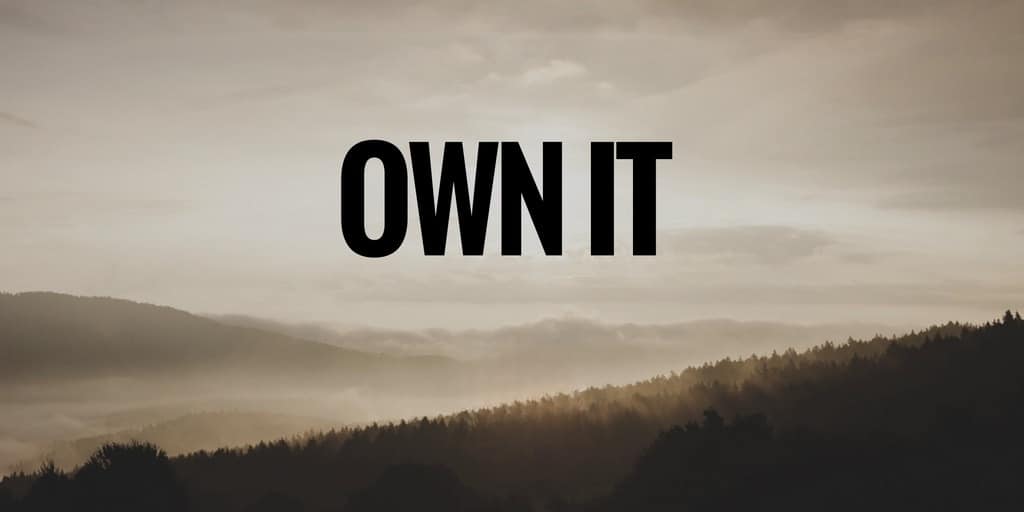adjust | thrive Own it

This month we focus on Ownership. It takes bravery to accept responsibility for the position you find yourself in. The first step in taking accountability for this is having the courage (the concept we shared with you last month) to acknowledge and then accept reality. You can only start to improve things in your life by taking full ownership of the past and present behaviour that keeps you in your current circumstances.
Taking ownership is the second step of acting above the line. Ownership shouldn’t depend on circumstances. We tend to take credit when things are going well and distance ourselves when things are bad. However, ownership is ownership, regardless of the outcome.
It might be pure coincidence that we are focussing on ownership in the month we celebrate spring. New life is often linked with the spring season, rising from the coldness and stillness of winter. There are many different patterns and observations that come with the beginning of spring. While variables such as plant and animal species may change depending on the ecology of the ecosystems where you live, many commonalities can be found across the globe when spring begins. This can be the same with humans and the behaviour we choose to display. When wetake ownership, we consider the following question: “What new behaviour can emerge and ultimately lead to new circumstances?”
THE CONSTRUCT OF OWNERSHIP
In psychology, ownership is the feeling that something is yours. People can feel ownership about a variety of things: products, workspaces, ideas, and roles. An example of ownership is the feeling that a product that you developed is yours and no one else’s. At its core, ownership is about possession, stewardship, and the need to have control over something.
Psychological ownership emerges in three ways:
- Control – Having control over a target can result in psychological ownership due to enhanced feelings of self-determination and responsibility.
- Intimate knowledge – The more we know something, the more likely we are to feel it belongs to us.
- Self-investment – By expending physical and mental energies, time, ideas, and skills in something, we begin to feel greater ownership.
OWNERSHIP IN ORGANISATIONAL SETTINGS
Ownership is distinctly related to psychological concepts such as organisational identification and organisational commitment. Organisational identification is the sense of belonging to an organisation and using the organisation to define oneself. An example of organisational identification could be proudly stating which organisation you work for in a casual conversation with a new acquaintance. Organisational commitment is defined as accepting the organisation’s goals, exerting effort, and a desire to maintain membership. An example of organisational commitment could be deciding to stay at an organisation despite receiving an attractive job offer from another organisation. In short:
- Psychological ownership answers the question: ‘what is mine?’
- Organisational identification answers the question: ‘who am I?’
- Organisational commitment answers the question: ‘should I stay?’.
OWN IT
Many people can lose heart and become discouraged when taking ownership of their circumstances, and this could erode individual as well as organisational performance. Truly owning the circumstances that you face requires you to make a link between what has happened and all the factors contributing to the current situation. Only then can you move to ownership – the ability to connect current circumstances with what you have done and the ability to tie future circumstances with where you are going to do.
OWNERSHIP CAN LEAD TO
Positive outcomes:
- Citizenship behaviour – deals with the actions and behaviours that are not critical to the job, however benefit the team and encourage even greater organisational functioning and efficiency. This is typically categorised as “ going above and beyond” or “ giving your all”.
- Discretionary effort – refers to the difference in the level of effort one is capable of bringing to an activity or a task, and the effort required only to get by.
- Personal sacrifice-is about exercising fortitude in hard times while not being complacent.
TO PONDER: FIVE WAYS TO HELP YOU TAKE OWNERSHIP
Owning it requires a candid acknowledgement of things that you’d probably rather sweep under the carpet. It requires the willingness to see both sides of the story. To see both sides can often be emotionally strenuous, and sometimes even a little painful. Therefore, you need to find the heart (courage) to own it.
Consider a situation where you swept something uncomfortable under the carpet:
- What facts, which you knew to exist, did you choose not to acknowledge?
- If you were to face the situation again, what would you do differently?
- What were the warning signs along the way?
- What could you have learnt from similar experiences that could have helped you to avoid a negative outcome?
- Can you see how your behaviour and actions prevented you from getting the results you wanted?
Once you begin to answer these tough questions, you start to see where you had opportunities to take ownership and accept responsibility for things that have gone wrong. When we understand and engage with the construct of ownership by going within – however painful – only then we can bloom.
“If we had no winter, the spring would not be so pleasant: if we did not sometimes taste of adversity, prosperity would not be so welcome.”
Anne Bradstreet

0 Comments